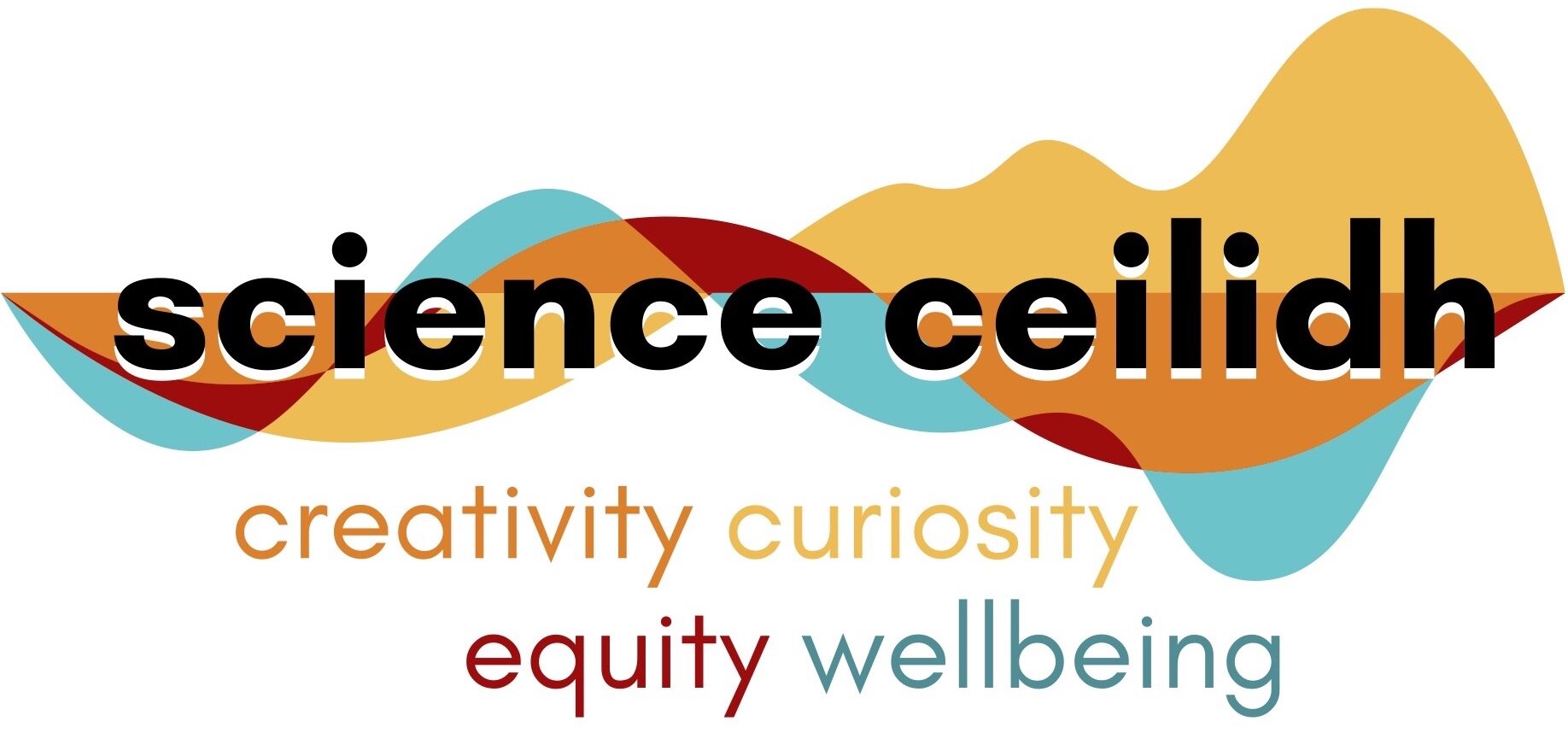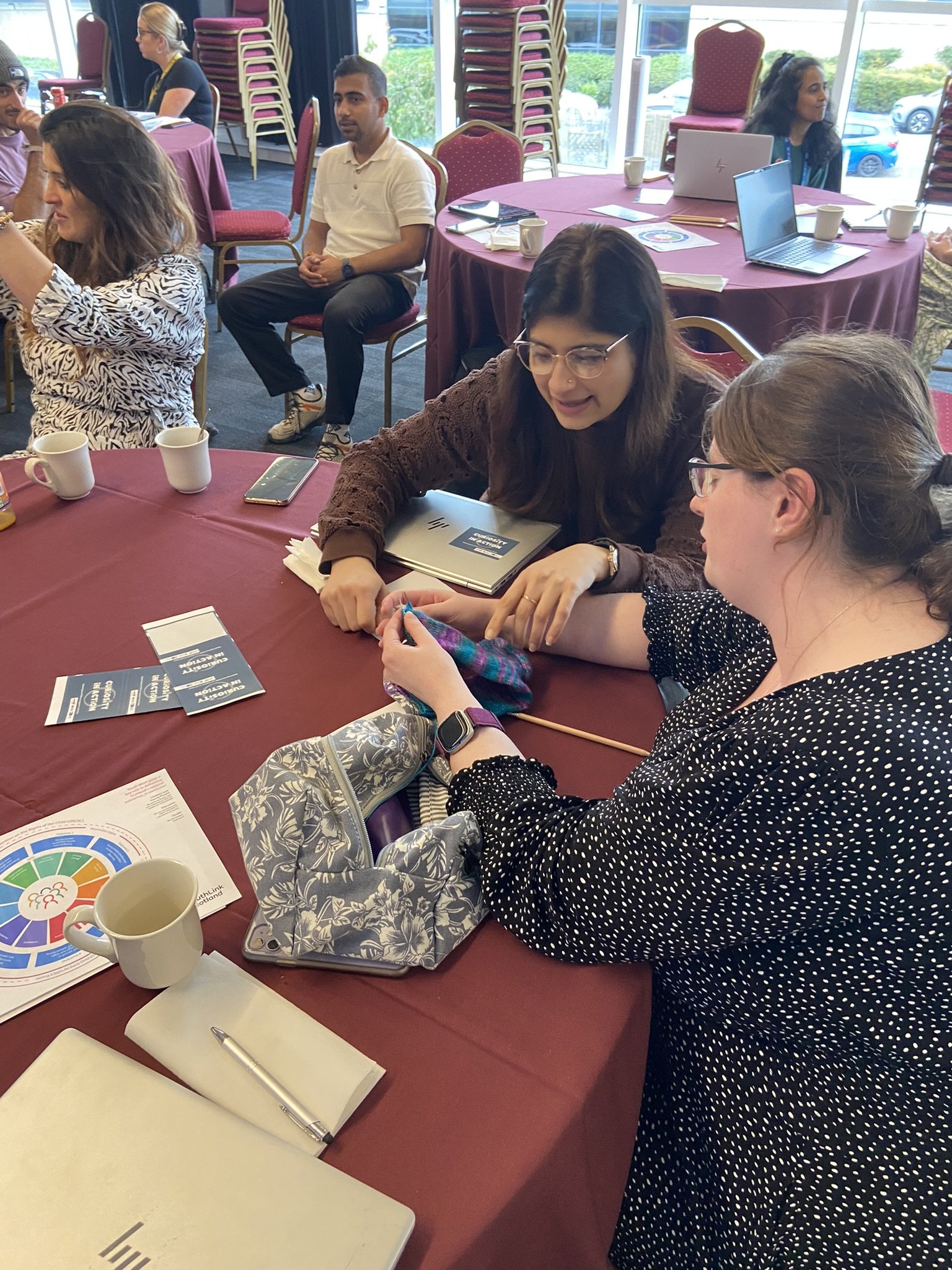Meet the Curiosity in Action year 2 partnerships!
Our second year of Curiosity in Action kicked off in October 2024 at the Hearts of Midlothian Innovation Centre with a day full of building relationships, trialling STEM and youth work activities, exploring evaluation practices and planning for the year ahead! We were joined by some familiar faces who will be continuing with the programme from year 1 and some new youth workers and researchers getting involved for the first time. Two of our steering group members, Hilary Phillips (Youthlink Scotland) and Abi Ashton (Royal Observatory Edinburgh), popped by to check in with the group and share a bit about their own experiences with this work.
Curiosity In Action is a two-year programme building an evidence-base, capacity and network in Scotland to explore the impact of STEM in youth work. The programme connects youth workers and researchers in a long-term partnership to develop and deliver activities with youth groups. It focuses on understanding how these activities impact young people's social development and foster resilience, communication, teamwork, and overall wellbeing in them. Through regular discussions and reflections, the programme aims to build a strong evidence base and network to support the integration of STEM in youth work in Scotland.
The 6 partnerships involved this year are:
Stuart Mitchell and Mari Welsh with Auchinleck Community Development Initiative and Andrew Spencer and Christopher Berry based at the University of Glasgow.
Kieran McPhail and Jordan McDonald with Paisley YMCA, David Boldrin and Connor Inglis based at the University of Glasgow, and Raj Kumar based at Strathclyde University.
Pauline Mathers and Grace Souter with Ormlie Community Association and Ruth MacKay based at the University of Aberdeen.
Kat Borrowdale with Think Circus and Rebekka Puderbaugh based at the University of Edinburgh.
Ainsley Carnarvon and Neve Chambers with Hearts of Midlothian FC Innovation Centre, Loki Muniraj based at Heriot-Watt University and Sarah Farrukh based at the University of Edinburgh.
Danielle McKinnon with Eat Sleep Ride CIC and Benjamin Bose based at the University of Edinburgh.
We spent the morning getting to know each other through a skills exchange activity in pairs that involved learning new languages, the practice of wiggling our ears and knitting! After lots of laughter from the skills exchange game, we reflected on the learnings from the first year and set shared values for working together over the next year. Those continuing from the first year shared their experiences from the programme, highlighting the importance of engaging young people through fun and exciting STEM activities. They also emphasised the need for consistent communication between partners while acknowledging this is challenging in practice with conflicting schedules and varying capacities. David, a researcher from the University of Glasgow who was involved in Year 1, shared that youth work had been new to him and he was terrified at first. The reward of stepping outside his comfort zone was building relationships with people across different fields and approaching activities with an understanding that just being comfortable and having fun with young people is a critical part of the process.
Shared values collected using mentimeter.
We chatted about the importance of shared values for building effective partnerships with respect, curiosity, equity, fun, collaboration, inclusivity, and patience being drawn out as the key values among the group. We reflected on how these values could influence our practice, such as through collaborative learning and mutual respect. Danielle, from Eat, Sleep, Ride youth group, shared that "horses have roles, not rankings" to illustrate the idea of equal partnership, where everyone contributes to the shared goal.
After lunch, the team at Hearts kindly gave us a tour around Tynecastle Stadium, its club museum and the innovation centre, where the youth group sessions take place. Reenergised with some fresh air the group spent some time in their partnerships planning for the year ahead. Some potential challenges were flagged that had come up in Year 1 including effective communication, navigating different schedules and capacities between the youth workers and researchers, and setting and evaluating clear goals. To mitigate these as best as possible, partners set mutual goals and expectations for the programme referencing the National Youth Work Outcomes & Skills Framework as well as a new model of inclusion developed with ASDC as they did this.It was also noted that a focus on relationship building with young people, rather than just sharing information, is a valuable outcome in itself, not to be overlooked. For those who did not have their partner there to spend this time planning together, we had a wider group discussion on how we felt about the year ahead. Those joining this year shared that there was a lot to digest coming in to the programme halfway through, and that it was difficult to envision how things would play out in practice but were enthusiastic with session ideas and open to a new approach to STEM engagement.
Getting hands-on for the rest of the afternoon, we tested a few evaluation tools for capturing impact and the groups reflected on how they could capture the impact of this work in their own settings. The evaluation activities we tried out on the day were a pants and tops washing line, feedback garden and question post box. Guidance for running the evaluation tools we worked through together can be downloaded here. Video diaries, recorded interviews and reflection diaries were all highlighted as effective tools by the youth workers in the room. Additionally, we spent time exploring the ethical considerations in action research with young people, including consent and safeguarding.
To round off the day, we took part in two STEM activities. The first was delivered by Abi, from the Royal Observatory Edinburgh, who brought along a box of space rocks sparking lots of conversations about how a demonstration activity can be delivered while maintaining an element of interaction to keep young people engaged. The second activity was run by Neve, one of the youth workers from Hearts Innovation Centre involved in year 1, who showed us all how to make ‘elephant's toothpaste’. This activity comes with preset expectations that aren’t always met, highlighting the importance of building up the young people’s resilience and managing their expectations when things don’t go as planned. A key learning that came up was the potential for adapting existing activities that young people are already familiar with and connecting them to STEM ideas, rather than creating new ones from scratch. For example, STEM links could be introduced in familiar activities, such as cooking or sports.
The second year of the programme builds on the work of the group from year 1 with continuous reflection and openness to learning and adapting remaining at the core of the action research project. This year there is a stronger focus on collaborative evaluation and building an evidence base to share our learning from the programme. Taking on board feedback from year 1, we have tried to match the youth groups with more than one researcher where possible to reduce the time commitment for the researchers involved and ensure consistency in the programme delivery for the youth workers and young people. We’re excited to see how the programme will evolve throughout the year and to share our learning as we go!
You can sign up to our Curiosity in Action mailing list here to be kept up to date with updates from the action research programme as well as any wider network events.










